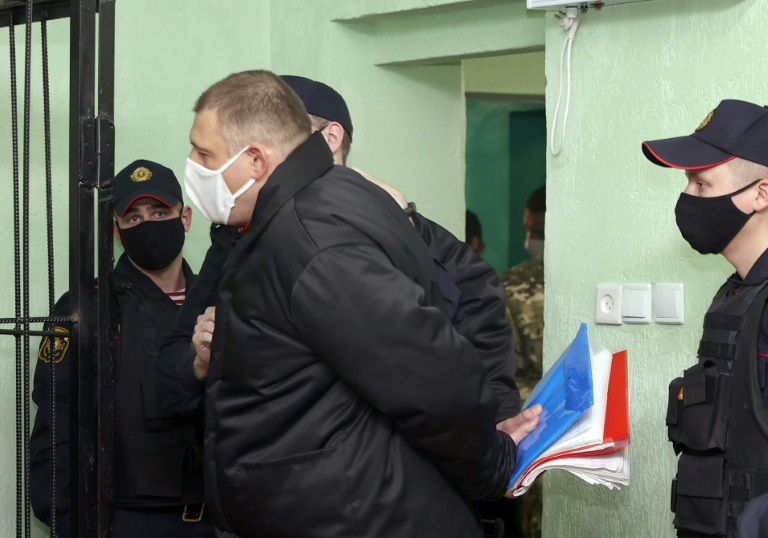A court in Belarus on Tuesday sentenced opposition leader Sergei Tikhanovsky to nearly two decades behind bars after he galvanised an unprecedented protest movement against strongman leader Alexander Lukashenko last year.
Tikhanovsky, a charismatic 43-year-old YouTube blogger, last spring launched a presidential campaign against Lukashenko, who has ruled the ex-Soviet country of around 9.5 million people with an iron grip since 1994.
While Belarusian authorities stopped Tikhanovsky’s campaign short — arresting him on charges of violating public order ahead of the August 2020 vote and keeping him in detention since — the protest movement he triggered eventually swelled to tens of thousands of people.
On Tuesday, following a months-long trial behind closed doors, a court found Tikhanovsky guilty of organising riots, inciting social hatred and other charges and sentenced him to 18 years in prison, state newspaper Sovetskaya Belarus reported.
His wife Svetlana Tikhanovskaya, who became opposition leader in his stead, denounced the verdict from self-exile in neighbouring EU member Lithuania.
“The dictator publicly takes revenge on his strongest opponents,” she wrote on Twitter after her husband was handed the sentence.
“While hiding the political prisoners in closed trials, he hopes to continue repressions in silence.
But the whole world watches. We won’t stop,” she added in English.
Tikhanovskaya, who was a political novice and stay-at-home mother of two at the time of her husband’s arrest, took his place on the ballot and is widely believed to have won the August 2020 vote, claimed by Lukashenko as a victory.
– ‘Never see my son’ –
But she was forced to flee the country soon after, when Lukashenko launched a vicious crackdown on the post-vote protests against his rule that saw hundreds of people jailed and many more leave the country.
Tikhanovsky, who coined the nickname “cockroach” for Lukashenko and whose supporters waved slippers —- often used to kill the insects — at rallies, was handed the longest prison sentence of any opposition leader so far.
“Eighteen years.
I won’t live that long,” his mother Sofya Tikhanovskaya told Radio Free Europe/Radio Liberty (RFERL).
“I’ll never see my son again.”
He was tried alongside five co-defendants, including veteran politician Mikola Statkevich, 65, who was sentenced to 14 years.
Statkevich challenged Lukashenko in elections in 2010 but was sentenced to six years in prison.
Both Tikhanovsky and Statkevich have been in custody since May 2020.
Little was known about the trial which began in June.
The four other co-defendants in the case, bloggers Igor Losik and Vladimir Tsyganovich and two activists linked to Tikhanovsky, Artyom Sakov and Russian citizen Dmitry Popov, received between 15 and 16 years in prison.
They join a growing list of people behind bars in Belarus.
As of Tuesday, there were 920 political prisoners in the ex-Soviet country, according to the Viasna rights group.
– ‘Our revolution isn’t lost’ –
Belarusian courts have been churning out guilty verdicts.
In September, a Belarusian court sentenced opposition leader Maria Kolesnikova to 11 years in prison for violating national security and conspiring to seize power.
The former flute player, who refused to go into exile, was part of a female trio of protest leaders along with Tikhanovskaya and Veronika Tsepkalo, who fled to Greece.
In July, another opposition leader and former banker, Viktor Babaryko, was sentenced to 14 years in prison on fraud charges.
Lukashenko has grown increasingly isolated in the wake of his post-vote crackdown.
Western countries have hit Belarus with waves of sanctions, including in response to Minsk allegedly engineering a migration crisis this year on EU member Poland’s doorstep.
But Lukashenko, who claims that the protest movement which has long subsided was directed by the West, has withstood the onslaught with the backing of his main ally and creditor Moscow.
Tikhanovskaya, meanwhile, has won recognition from Western governments as Belarus’s top opposition leader and has been lobbying for change in the country ever since.
After her husband’s verdict was delivered, she told RFERL that Belarus’s “peaceful revolution” isn’t lost.
“There is no magic button we can press and there it is, freedom,” she said.
“We must be persistent, patient.”











